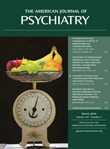In This Issue
Clinical Guidance: Mirtazapine Augmentation of Standard Antidepressant Treatment
Blier et al. (p. Original article: 281) report that mirtazapine (30 mg/day) augmented the antidepressant effects of standard doses of fluoxetine, bupropion, or venlafaxine. Augmentation was demonstrated by increased mean clinical improvement after 6 weeks of treatment in groups of patients who were not treatment resistant (figure above). Dr. John Rush notes in an accompanying editorial (p. Original article: 241) that remission rates of over 50% were achieved with combination treatment, compared to 25% with fluoxetine alone. Increased side effects, including somnolence and weight gain, preclude using the combination as a first-line treatment.
The STAR*D study earlier reported two trials with mirtazapine in treatment-resistant depressed patients. Mirtazapine alone produced modest remission rates (12%) in patients who had not responded to two previous trials with antidepressants (Original article: Am J Psychiatry 2006; 163:1161–1172). For patients who had failed three previous trials, mirtazapine combined with venlafaxine produced a 14% remission rate (Original article: Am J Psychiatry 2006; 163:1531–1541).
Prognosis for Bipolar Depression With Substance Disorder
Recovery from an episode of bipolar depression takes no longer for patients with a coexisting alcohol or drug use disorder than for bipolar patients without a substance use disorder. This similarity in the Systematic Treatment Program for Bipolar Disorder (STEP-BD) emerged from an analysis by Ostacher et al. (p. Original article: 289) of prospective data on 2,154 patients who developed a major depressive episode. Despite comparable recovery times, bipolar patients with substance use disorder were more likely to switch from depression into mania, hypomania, or a mixed state. The greater risk of switching was also observed in patients with a history of substance use disorder in the past.
Psychiatric Outcomes of Traumatic Injury
Depression and generalized anxiety disorder, not posttraumatic stress disorder (PTSD), were the most common new psychiatric disorders in the year following traumatic injuries to 817 patients. Bryant et al. (CME, p. Original article: 312) also note that PTSD typically occurred in the presence of another psychiatric disorder. Overall, 23% of the patients developed psychiatric disorders, and patients with mild traumatic brain injury were twice as likely as other patients with traumatic injuries to develop PTSD, panic disorder, agoraphobia, or social phobia. Mild traumatic brain injury was associated with functional impairment only in the presence of a psychiatric disorder.
Modafinil Improves Sleep in Cocaine Users
Several measures of sleep and sleepiness responded better in chronic cocaine users who received 400 mg/day of modafinil over 3 weeks of abstinence than in those who received placebo. Nocturnal recordings by Morgan et al. (p. Original article: 331) demonstrated that at 3 weeks the modafinil group had longer total and slow-wave sleep times than the placebo group. In addition, whereas the placebo group had a significantly longer latency before sleep onset and a shorter REM sleep time than healthy subjects, the modafinil group was closer to normal. Subjective morning sleepiness was less in weeks 1–3 for the patients taking modafinil, and afternoon sleepiness was less in weeks 2 and 3. In an editorial on p. Original article: 248, Drs. Charles Dackis and Charles O'Brien note that modafinil, which has effects on dopamine neurotransmission, is being investigated as a treatment for cocaine dependence.




